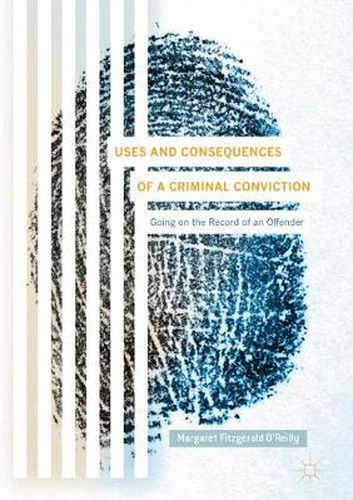Readings Newsletter
Become a Readings Member to make your shopping experience even easier.
Sign in or sign up for free!
You’re not far away from qualifying for FREE standard shipping within Australia
You’ve qualified for FREE standard shipping within Australia
The cart is loading…






This title is printed to order. This book may have been self-published. If so, we cannot guarantee the quality of the content. In the main most books will have gone through the editing process however some may not. We therefore suggest that you be aware of this before ordering this book. If in doubt check either the author or publisher’s details as we are unable to accept any returns unless they are faulty. Please contact us if you have any questions.
This book examines the increasing retention and use of previous criminal record information, within and beyond the criminal justice system. There remains a misconception that once an offender has served the penalty for an offence, his or her dealings with the law and legal system in relation to that offence is at an end. This book demonstrates that in fact the criminal record lingers and permeates facets of the person’s life far beyond the de jure sentence. Criminal records are relied upon by key decision makers at all stages of the formal criminal process, from the police to the judiciary. Convictions can affect areas of policing, bail, trial procedure and sentencing, which the author discusses. Furthermore, with the increasing intensifying of surveillance techniques in the interests of security, ex-offenders are monitored more closely post release and these provisions are explored here. Even beyond the formal criminal justice system, individuals can continue to experience many collateral consequences of a conviction whereby access to employment, travel and licenses (among other areas of social activity) can be limited as a consequence of disclosure requirements. Overall, this book examines the perpetual nature of criminal convictions through the evolution of criminal record use, focussing on the Irish perspective, and also considers the impact from a broader international perspective.
$9.00 standard shipping within Australia
FREE standard shipping within Australia for orders over $100.00
Express & International shipping calculated at checkout
This title is printed to order. This book may have been self-published. If so, we cannot guarantee the quality of the content. In the main most books will have gone through the editing process however some may not. We therefore suggest that you be aware of this before ordering this book. If in doubt check either the author or publisher’s details as we are unable to accept any returns unless they are faulty. Please contact us if you have any questions.
This book examines the increasing retention and use of previous criminal record information, within and beyond the criminal justice system. There remains a misconception that once an offender has served the penalty for an offence, his or her dealings with the law and legal system in relation to that offence is at an end. This book demonstrates that in fact the criminal record lingers and permeates facets of the person’s life far beyond the de jure sentence. Criminal records are relied upon by key decision makers at all stages of the formal criminal process, from the police to the judiciary. Convictions can affect areas of policing, bail, trial procedure and sentencing, which the author discusses. Furthermore, with the increasing intensifying of surveillance techniques in the interests of security, ex-offenders are monitored more closely post release and these provisions are explored here. Even beyond the formal criminal justice system, individuals can continue to experience many collateral consequences of a conviction whereby access to employment, travel and licenses (among other areas of social activity) can be limited as a consequence of disclosure requirements. Overall, this book examines the perpetual nature of criminal convictions through the evolution of criminal record use, focussing on the Irish perspective, and also considers the impact from a broader international perspective.